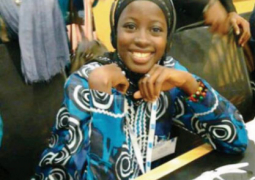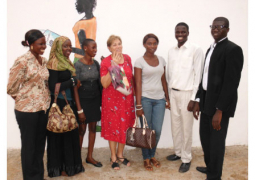Fifty security officers drawn from different units of the armed forces, six chiefs, women and opinion leaders from the Upper River Region, recently participated in a training workshop on gender- based violence, sexual and reproductive health rights and traditional practices in Basse, Upper River Region. The training was last week Friday, organised by the Gambia Committee On Traditional Practices Affecting The Health of Women and Children( GAMCOTRAP)
Deputising for the Governor of the Upper River Region, Mr. M.S Kah, said training security officers would empower them to deal with issues affecting women and girls, both in their professional and private lives. He reminded them that, traditions are unwritten and people need to be aware why they have to change those practices affecting the development of humanity.
Deputy Governor Kah called for proper dissemination of the knowledge gained from the programme. "People are empowered because of information" he emphasised.
Mr. Kah thanked GAMCOTRAP and its partners for supporting the training of the security officers on FGM, in particular, noting that "the aim is to make them understand who, when, where and why it is practised in order to protect lives."
He pointed out that security is a fundamental aspect of development, and as a result they have a role to play in nation-building. He highlighted that NGOs are engaged in complementing government's efforts in development process.
The Chief of Basse, Hammeh Krubally welcomed the participants and informed them that they would learn a lot from GAMCOTRAP.
In her statement, the elected Area Councilor and Women's Leader in Basse, Mariama Jaw described the training as an important initiative as, according to them, they are parents and members of society before becoming security agents.
She noted that they need the right information to protect their girl-children from FGM and other harmful traditional practices. She then called for an annual training of security officers. As he put it, they are frequently on transfer to other regions.
Speaking on behalf of the Commissioner of Police in the Upper River Region, the Officer-in-Command of Basse Police, ASP Mam Balla Bittaye, said the work of security officers requires knowledge "to fulfil their prime function of saving lives". He called on his colleagues to share the knowledge gained from the training with others.
The Executive Director of GAMCOTRAP, Dr. lsatou Touray called on the security officers to play their role in protecting the rights of women and girls against Female Genital Mutilation because "it violates their bodily integrity and rights".
As security officers, they are expected to be aware of all the international, regional and national commitments that are geared towards the respect of human dignity and promotion of women and children's rights, the girl-children, in particular.
Human Rights Activist, Kebba Susso of Basse Mansajang, called on those "in uniform" and in authority to be good role models for the rest of society. He raised concern over the escalating rate of impregnating girls by people in position of power, most of them, he said, deny the act. Amongst the issues raised was forced-marriage and how it affects the rights of the girl-children, social cohesion and disrupts families.
On Female Genital Mutilation, he said, the National Assembly should pass a specific law against the practice and noted that they would play their role in implementing it. Some of the participants also promised to protect their own daughters against FGM, acknowledging that ignorance of the effects FGM has on girls and women is one of reasons why they continue to subject them to the practice.
The participants were also reminded that FGM is neither a Quranic injunction nor an obligation for females.
The workshop was an opportunity for the security officers to learn about the Convention on the Elimination of all forms of discrimination against women- CEDAW, the Convention on the Rights of the Child- CRC, the Protocol to the African Charter on the Rights of women in Africa, among others, and the role of the security in the prevention of rape and other forms of violence against women.




